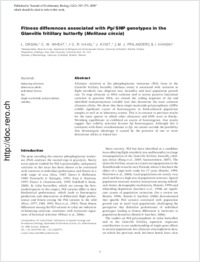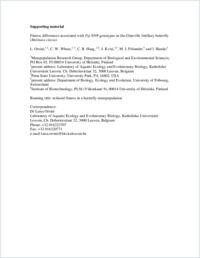Fitness differences associated with Pgi SNP genotypes in the Glanville fritillary butterfly (Melitaea cinxia)
- Orsini, L. Metapopulation Research Group, Department of Biological and Environmental Sciences, University of Helsinki, Finland
- Wheat, C. W. Metapopulation Research Group, Department of Biological and Environmental Sciences, University of Helsinki, Finland - Department of Biology, Penn State University, USA
- Haag, Christoph R. Metapopulation Research Group, Department of Biological and Environmental Sciences, University of Helsinki, Finland - Department of Biology, University of Fribourg, Switzerland
- Kvist, J. Metapopulation Research Group, Department of Biological and Environmental Sciences, University of Helsinki, Finland - Institute of Biotechnology, University of Helsinki, Helsinki, Finland
- Frilander, M. J. Institute of Biotechnology, University of Helsinki, Helsinki, Finland
- Hanski, I. Metapopulation Research Group, Department of Biological and Environmental Sciences, University of Helsinki, Finland
-
20.10.2008
Published in:
- Journal of Evolutionary Biology. - 2009, vol. 22, no. 2, p. 367-375
balancing selection
deleterious allele
individual fitness
Pgi
single-nucleotide polymorphism
viability
English
llozyme variation at the phosphoglucose isomerase (PGI) locus in the Glanville fritillary butterfly (Melitaea cinxia) is associated with variation in flight metabolic rate, dispersal rate, fecundity and local population growth rate. To map allozyme to DNA variation and to survey putative functional variation in genomic DNA, we cloned the coding sequence of Pgi and identified nonsynonymous variable sites that determine the most common allozyme alleles. We show that these single-nucleotide polymorphisms (SNPs) exhibit significant excess of heterozygotes in field-collected population samples as well as in laboratory crosses. This is in contrast to previous results for the same species in which other allozymes and SNPs were in Hardy–Weinberg equilibrium or exhibited an excess of homozygotes. Our results suggest that viability selection favours Pgi heterozygotes. Although this is consistent with direct overdominance at Pgi, we cannot exclude the possibility that heterozygote advantage is caused by the presence of one or more deleterious alleles at linked loci.
- Faculty
- Faculté des sciences et de médecine
- Department
- Département de Biologie
- Language
-
- English
- Classification
- Biology, life sciences
- License
-
License undefined
- Identifiers
-
- RERO DOC 12942
- DOI 10.1111/j.1420-9101.2008.01653.x
- Persistent URL
- https://folia.unifr.ch/unifr/documents/301290
Other files
Statistics
Document views: 109
File downloads:
- pdf: 182
- Supplementary material: 138

